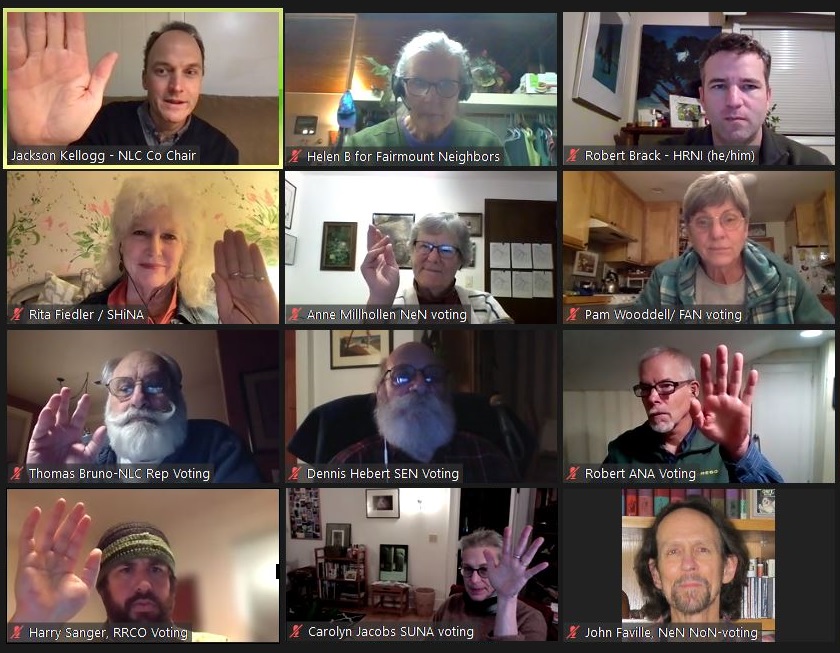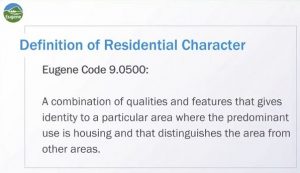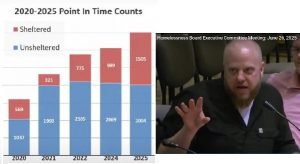Bypassed on HB 2001, neighborhood leaders ask: Why do we have NLC?
7 min read
Bypassed on HB 2001, neighborhood representatives wondered, Why do we even have a Neighborhood Leaders Council?
The City of Eugene looks at changing neighborhood boundaries, as a way to revive dormant neighborhood associations. But after HB 2001, some neighborhoods ask: What’s the point? At the November Neighborhood Leaders Council, the City’s Robert Brack.
[00:00:16] Robert Brack: There’s places where people just don’t have a neighborhood association to get their voice heard, you know, places like Far West or West Eugene, and that’s something that we want to look at to fix.
[00:00:27] Our office is going to be looking at inviting associations, if you want to look at your neighborhood boundaries in the same way that we had the ward boundary redesign, so that they can be organized in a way to encapsulate those areas that have largely been inactive and provide a place for those residents in those communities to be a part of active neighborhood associations.
Thank you for supporting
local citizen journalism
[00:00:52] We’re not looking to say that this group has to get bigger, this group has to split, or these have to combine. It’s more of an invitation for neighbors to have those conversations and talk about what’s going to be the best way to help represent and support neighborhoods.
[00:01:06] Everything’s preliminary right now until we’re directed from Council to say ‘Yes, go in and help support neighborhood associations to have those conversations.’ But that’s something that I hope to bring in January, to say we are moving forward with this, and here’s the timeline, and here’s the project, and here’s what we’re going to do.
[00:01:23] John Q: The NLC later gave the City feedback on its public process for H B 2001.
[00:01:31] Laurel Hill Valley, Tom Bruno: HRNI, I think you guys need to talk to the Planning Commission and the Planning Department, particularly with HB 2001. Everybody in NLC is a voted member by the neighborhoods, and it seems like we were slighted. We should have had more at the table for HB 2001. And I don’t know if they’re afraid to ask for our information, ask for our input, and I guess my real beef is, why isn’t HRNI saying, ‘Hey Planning Commission, Hey Planning Department, come to NLC. These are the people that are elected. These speak for the neighborhoods.’ If not, why do we have NLC?
[00:02:29] River Road, Harry Sanger: Robert, you said that you wanted to get increased involvement where the City can come and present to us, can come talk to us. And I think that the question is, How does NLC get to talk to the City? You know, we’ve got 20 leaders of the community right here. How do we get a seat at that table before the plan is already set?
[00:02:48] We at River Road Community Organization, we took advantage of the ‘meeting in a box’ that was provided, but then that was, already determined— here’s your options, and just asking us for feedback on the options.
[00:03:01] Before the three options are even presented, how do we get our foot in the door and advance and have a seat at that table and have a voice, in what the city’s decision-making process is, rather than just being told what it is later.
[00:03:13] 80% of the zoning in Eugene is single family housing, but under House Bill 2001, that number goes from 80 to zero. And so I think the role of our Planning Commission is to take that number from 80 to 70, if need be from 80 to 60 and to plan development around areas that have the infrastructure and can support it. That’s the type of voice that we’re not able to give.
[00:03:41] South University, Carolyn Jacobs: The planning commission are a bunch of volunteers right? Supposedly they have a broad range of thinking and it’s not obvious they do, but, supposedly in our city, they are the site of the Committee for Citizen Involvement, CCI, which is a state Goal One thing. Our city has made probably a questionable choice of seating that with the Planning Commission, but nevertheless, right now that’s where it is. And so they can, in that role, they can decide what public involvement should look like.
[00:04:18] And if you look in the state stuff, it says the last advisable place to seat your Committee for Citizen Involvement is with your Planning Commission. There are many better ways to do it and there have been many times over the last many years when it’s actually come up as a topic of conversation here, we should recommend or discuss how it might be better done because , it’s questionable whether we should have really gone with Planning Commission as the people taking care of our obligation for citizen involvement. It really comes down from the state and we could have chosen to do it a very different way
[00:04:54] The trouble is most people in the city don’t know what’s going on. Right. The truth, the bottom line is, most citizens in this city have no idea what’s going on. No idea what could happen. Nothing. They have no idea. So the more that you can spread the word, that’s probably the best.
[00:05:15] Friendly Area Neighbors, Pam Wooddell: I’m with South Willamette and I don’t know if you were around in 2015 for that fiasco that happened where all this, hours and hours and hours of planning time, and they had their focus groups and their round tables and all this stuff, and it’s still the whole thing blew up because the public didn’t know about it until the last minute. They had to dump it because it was so unpopular. That’s the risk of not having the neighborhoods bring them along. And if this is such a great idea, then start explaining it early and, you know, let us get the questions out early It’s discouraging for me to see this of kind of happen again. I mean, it’s not as bad as it was before, but it’s almost.
[00:05:49] I don’t know how many people watch the public hearing on the 16th. A lot of us argued till we ran out of breath for the very thing you said, Harry, is that blanket zoning doesn’t make sense. And we need to put the kind of housing that we need where it’s needed. And nobody’s still talking about the nuts and bolts of how exactly are we going to do this in a way that’s equitable. We still kind of come out as like we’re NIMBYs, but we’re just trying to make it work so it doesn’t hurt poor people.
[00:06:20] Southeast Neighbors, Dennis Hebert: I was an observer at the meeting that Pam is speaking of last week and, did a tally and there was like 32 or 33 comments that came in. Of those only six were against House Bill 2001 and 20 something in favor. There was at least half who were on the panel that were architects, developers and real estate people. So some of these people were hand-picked to be on that panel to give them the answer that they wanted. That’s what I took away from that Planning Commission meeting and the public comment section.
[00:07:03] Southwest Hills, Rita Fiedler: I wonder if this might not be the moment for Harry, Pam and Carolyn and anyone else who’s interested to ask Robert if you three or four folks can’t have a one-on-one coffee.
[00:07:20] You already have three determined leaders who represent neighborhoods, who I feel are informed and have some history with the issue, whose voices are articulate and poised to be heard. Rather than diluting that by packets and, calls for more input. We have input. That’s what’s happening here tonight. You’re a bridge to the city staff in this regard. And we have some, I think, well-spoken people who have important opinions should be heard directly.
[00:07:58] John Q: The Planning Commission takes comments through 5 p.m. on Monday, Nov. 29.Send your e-mail to: MiddleHousingTestimony@Eugene-OR.gov. NLC leaders also recommend contacting the City Council.
[00:08:14] Robert Brock also announced election results. We have two new neighborhood members of the Multi-Unit Property Tax Exemption committee.
[00:08:22] Robert Brack: The MUPTE vote came out. The two elected were Catherine Jensen and Steven Baker.
[00:08:29] John Q: Robert said the Oregon 22 event is looking for helpers.
[00:08:33] Robert Brack: There’s a lot of community partners working with Oregon 22, who is the group that is putting all of the events together for the Oregon 22 track and field championships that are coming here to Eugene and they are moving and shaking. Right now they’re doing a big volunteer call-out.
[00:08:50] If there are people in your neighborhood association that are interested in volunteering for hosting the event, Oregon 22 is looking for volunteers and there’s some job openings and job applications on their website. So if people are looking for a temporary job, you can funnel people to Oregon 22 to apply. If you have any questions about neighborhood associations and partnerships with Oregon 22, please feel free to give me a call or email, and I’d be happy to share that info with you.



